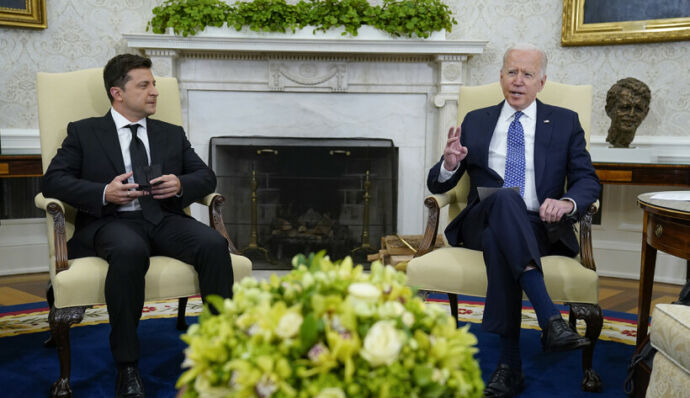When President Biden finally met his Ukrainian counterpart Volodymyr Zelensky on September 1, it was the culmination of a two-year effort by top officials in Kyiv. Originally conceived as a meeting between Zelensky and then-president Donald Trump, it was meant to signal the commitment of the two countries in countering Russian aggression and supporting Ukraine’s path toward Euro-Atlantic integration. These plans were put on the shelf when U.S.-Ukraine bilateral relations had grown politically toxic after Ukraine became the central focus of former president Trump’s first impeachment hearing. Only now, after a change in U.S. administration, is this relationship able to be restored to some semblance of normalcy on the U.S. foreign policy agenda.
After the U.S.-Russia summit in Geneva in June and the delay in scheduling his meeting in the Oval Office, President Zelensky as well as senior Ukrainian officials were increasingly concerned that the United States and Western Europe capitals were turning their backs on Ukraine in hopes of normalizing their own relations with Russia. President Biden’s decision to seek a meeting with Putin following a rapid escalation of Russian military forces in Crimea and along the border with Ukraine was seen by many in Kyiv as rewarding the Russian leader’s brinksmanship. Further reports that the U.S. Navy had recalled two warships dispatched to the Black Sea at the height of tensions in April and that the United States froze $100 million in security assistance to Ukraine in the run-up to the Geneva summit exacerbated the belief that Biden was walking back his support of Ukraine in exchange for a “stable, predictable” relationship with Russia. Ukraine’s lack of progress in obtaining a NATO membership action plan—which Kyiv officials breathlessly pursued following Russia’s build-up of military forces—combined with the U.S. decision to not impose sanctions on German entities related to the Nord Stream 2 gas pipeline were seen in Kyiv as further evidence of waning support from Ukraine’s Euro-Atlantic partners. Accordingly, Zelensky and his advisers consistently emphasized in the run-up to the meeting with Biden that they expected tangible commitments from the United States in the areas of defense cooperation and energy security.
For the Biden administration, the meeting offered a chance to reaffirm U.S. support for a strategic partner on Russia’s border and demonstrate that the United States is not retreating from its commitments to allies and partners, particularly following the withdrawal of U.S. forces from Afghanistan and the collapse of the government in Kabul. It also gave President Biden an opportunity to reinforce Secretary of State Blinken’s earlier “twin challenges” message made during his visit to Kyiv in April, when he equated Russia’s armed aggression in Ukraine with the “internal aggression” posed by corrupt actors, self-interested oligarchs, and those who wished to undermine reforms.
Key Outcomes from the White House Meeting and Next Steps
Last week’s meeting between Biden and Zelensky should put Washington and Kyiv on firmer footing. The Joint Statement on the U.S.-Ukraine Strategic Partnership emphasized that “Ukraine’s success is central to the global struggle between democracy and autocracy” and reflected the broad scope of the U.S. commitment to Ukraine. The document outlined an ambitious plan for enhanced cooperation across several key areas, including defense, climate change, and economic growth; critically, it also put long-stalled anti-corruption and governance reforms back in the spotlight. To be sure, several important issues—particularly regarding defense and energy security—require further elaboration, and Zelensky was likely disappointed by the United States’ cautious stance on Ukraine’s bid for NATO membership, the relatively small amount of newly pledged security assistance, and a lack of clarity about how the United States would respond to possible Russian attempts to exploit gas exports via Nord Stream 2 to harm Ukraine. However, the two presidents accomplished the important task of reaffirming the guiding principles of the relationship and developing a framework for future cooperation. The question of whether the meeting can be deemed a success depends on how Biden and Zelensky’s top foreign policy hands elaborate specific plans to achieve those overarching goals.
This task falls mainly on the Strategic Partnership Commission (SPC), which has been moribund since 2018. Secretary of State Blinken and Foreign Minister Dmytro Kuleba will meet this autumn to approve a new U.S.-Ukraine Charter on Strategic Partnership that will “reinvigorate” the SPC and make it more responsive to modern-day challenges. The previous charter was signed in 2008—well prior to Russia’s annexation of Crimea and the outbreak of conflict in Ukraine’s eastern regions, as well as the establishment of several of Ukraine’s anti-corruption institutions—so substantial revisions will be needed. The work of the SPC will be supported by the establishment of a Strategic Defense Framework that will help Ukraine and the United States develop specific plans for cooperation in several key areas, including cyber defense, Black Sea maritime security, intelligence sharing, and reforms in the defense and military-industrial sectors, while the Strategic Energy and Climate Dialogue provides a forum for further discussions on energy security, including Ukraine’s green transition and the response to Nord Stream 2. In the absence of a similar sectoral forum on governance, justice, and rule of law, the SPC will serve as the locus of discussions on Ukraine’s reform efforts.
Keeping the Focus on Democracy and Anti-corruption in Ukraine
As the Biden administration prepares for the reboot of the SPC, it should continue to put U.S. support for Ukraine’s democratic transition and its fight against corruption front and center. Ukraine could become an example of success at a critical time for democracies worldwide. Recent polling shows that Ukrainians are overwhelmingly committed to a democratic future, but they are deeply concerned about corruption and believe the Zelensky administration has not done enough to address the problem. The difficulty of reorienting mindsets and institutions should not be underestimated, but public demand for progress could provide Zelensky with an impetus to begin to challenge the obstructionism of vested interests.
The joint statement clearly defines the type of action Washington wants to see in order to be confident of Ukraine’s commitment to reform: a fair and unimpeded process for selecting a specialized anti-corruption prosecutor and protection of the National Anti-Corruption Bureau from lawfare and reputational attacks. Strong and continuous messages by the United States should help stimulate progress and encourage reluctant Ukrainian lawmakers and officials to take difficult steps. The $3 billion in investment assistance referenced in the joint statement can serve as an additional incentive, accompanied by active engagement by NATO to continue to strengthen institutional ties.
The United States is not alone in adopting a firmer approach toward Ukraine. NATO secretary general Jens Stoltenberg bluntly stated in June that “we need more” from Ukraine when it comes to the implementation of anti-corruption and integrity-building reforms. Similarly, Estonian president Kersti Kaljulaid noted last month that “concerns with the courts” were impeding Ukraine’s aspirations to join the European Union and that it would take another 20 years of work to prepare for membership.
These were difficult messages for Kyiv to hear, but it would be a mistake to interpret them as a sign of eroding support. Rather, they should serve as a wake-up call that a trust gap has emerged between Kyiv and Western capitals due to Ukraine’s history of backsliding. Zelensky must show that Ukraine is serious about building a more accountable and responsive government and not just going through the motions to obtain loans from its international partners and financial institutions and to prolong sanctions on Russia. The anticipated $277 billion price tag of the transformation plan that Ukraine will present at the next SPC meeting raises some concerns in this regard. However, Zelensky has plenty of opportunities to demonstrate some progress on reforms in the near term, such as adopting a de-oligarchization draft law pending in Ukraine’s parliament and ensuring it is applied objectively, implementing new legislation on judicial reform, and prosecuting high-ranking officials and oligarchs when there is credible evidence of their criminal activities.
Focusing on Ukraine’s democratic transition should not diminish joint efforts to counter Russian aggression; if anything, they are mutually reinforcing. Strengthening institutions and fighting corruption should be seen as a critical aspect of Ukraine’s national security policy, given that Russian information campaigns consistently have sought to undermine trust in public institutions in order to keep Ukraine within Moscow’s self-defined sphere of influence. With the Minsk process stalled, the prospect of a renewed U.S.-Russian channel for talks on the Ukraine crisis unlikely, and Russia turning Crimea into a defensive bastion, Ukraine has little choice but to practice “strategic patience” to restore control over its territory while it undertakes reforms to build a more open society based on respect for human rights and rule of law. This is the strong foundation upon which the eventual reintegration of Crimea and non-government-controlled areas of the Donetsk and Luhansk regions can be built. The future of U.S.-Ukraine relations will be based on the long, hard slog that is the Ukrainian reform process. The path forward for Zelensky is challenging, but a vigorous campaign to safeguard the integrity of public institutions and to hold corrupt actors accountable will enable him to unlock U.S. and European assistance and opportunities for further cooperation with Euro-Atlantic institutions. Ultimately, it is not high-profile visits, commissions, or press statements that will bring Ukraine the international support that it seeks—just really hard work.












